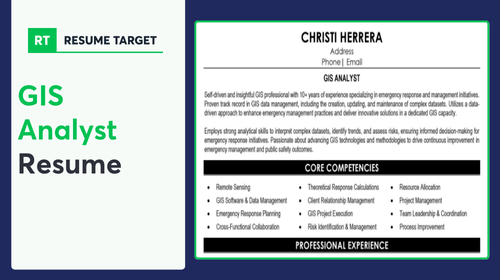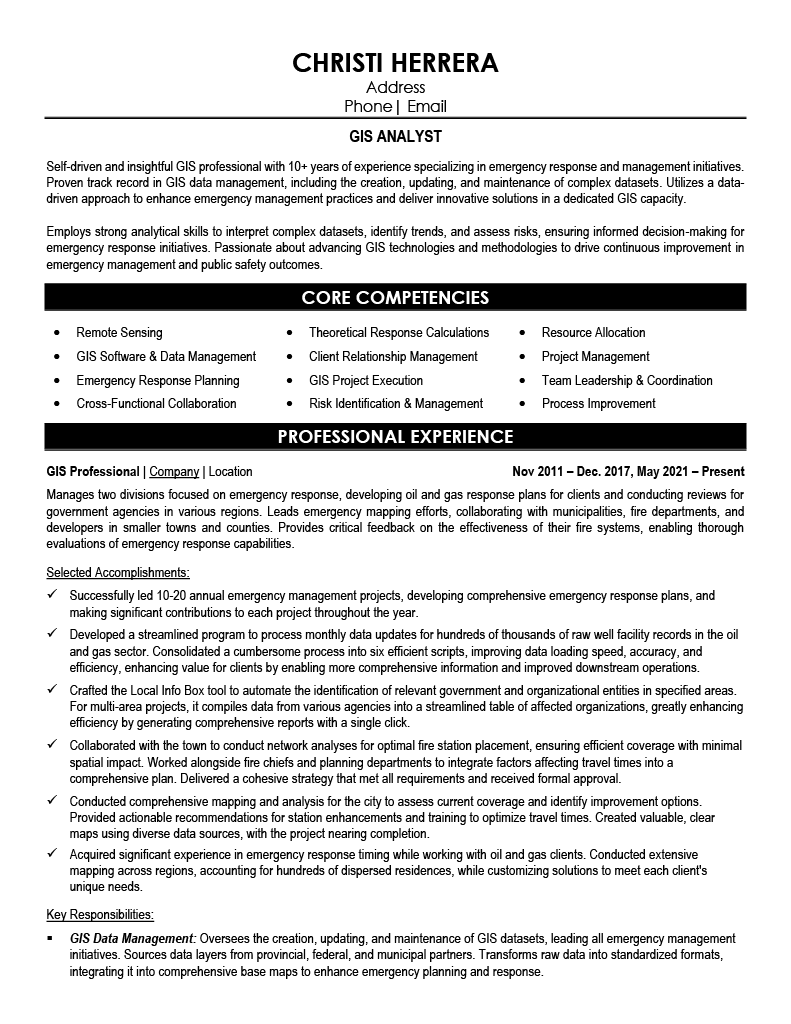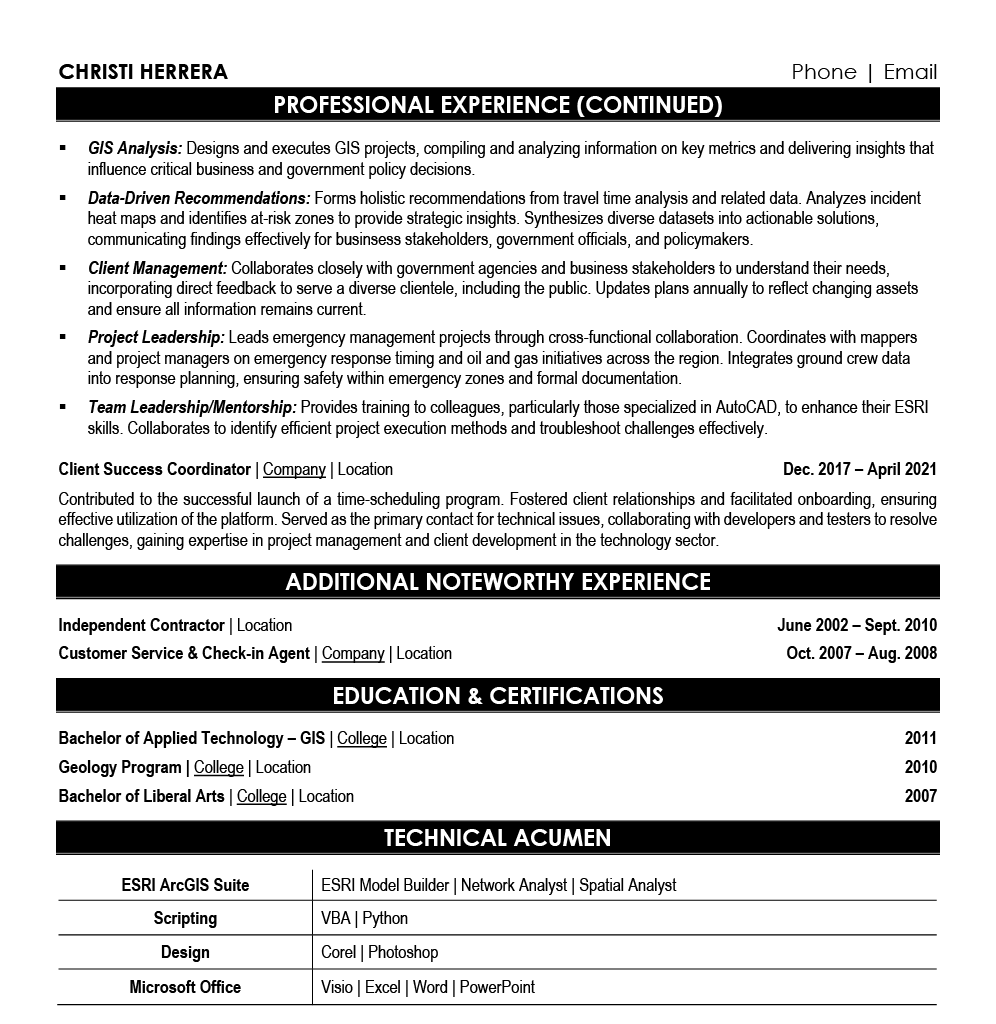

Mapping your career path is complex when your resume doesn't capture your full technical expertise. Many GIS Analysts struggle to translate their spatial analysis skills into compelling resume content that hiring managers understand.
Are you finding it challenging to showcase both your technical abilities and business impact? Your resume needs to bridge the gap between complex GIS terminology and real-world applications that matter to employers.
Resume Target specializes in helping GIS professionals communicate their value clearly and effectively. We'll help you create a powerful resume that highlights your spatial analysis expertise while demonstrating how your work drives important business decisions.


In today's data-driven world, GIS Analysts are the modern-day cartographers who transform complex geographical data into actionable insights, with the ability to implement spatial analysis and develop sophisticated mapping applications that help organizations make informed decisions about everything from urban planning to natural resource management.
As a GIS Analyst, you'll combine your expertise in geographic information systems with data analysis skills to create digital maps, analyze spatial patterns, and translate complex geographical data into clear visual stories that help solve real-world problems.
Whether you're just starting out or looking to advance your career, the field of GIS offers diverse opportunities for growth, from specializing in environmental analysis to advancing into senior roles where you'll lead major mapping projects and shape the future of spatial technology.
Let's talk about what's exciting in the GIS Analyst field! Your career path as a GIS Analyst offers impressive earning potential that grows substantially with your expertise and specialization. As you develop your skills in geographic information systems, you'll find numerous opportunities to advance and increase your earning power.
Figures from: Salary.com
Start your GIS journey as a technician and climb to leadership roles like GIS Project Manager or Developer. With the right certifications and skills, you can advance rapidly in this growing field.
Beyond basic mapping abilities, advancing in GIS requires mastery of technical tools, programming languages, and strong leadership capabilities.
- Advanced spatial analysis and modeling - Programming proficiency (Python, R, JavaScript) - Database management and SQL expertise - Project leadership and team collaborationBreaking into GIS analysis typically starts with entry-level mapping roles, where combining technical skills with GIS certifications can help you land your first position in this growing field.
To advance in this field, you'll need to develop strong IT skills and proficiency in programming languages like Python or R, which will set you apart from other candidates and prepare you for more complex analytical roles.
Requirements from Medium Tierra Insights
From engineering firms to energy companies, GIS Analysts are in high demand across both coastal and inland states.
Figures from Zippia
Struggling to map out the perfect GIS Analyst resume that showcases your technical expertise, spatial analysis skills, and project achievements in a way that catches employers' attention? Follow our section-by-section guide to create a resume that clearly demonstrates your GIS capabilities and professional impact.
As a GIS Analyst, you know how to transform complex spatial data into clear, actionable insights - but condensing your professional story into a few powerful lines can feel more challenging than the most complex mapping project.
While you excel at analyzing geographic information systems and creating detailed visualizations that drive decision-making, capturing those specialized technical and analytical abilities in a compelling summary requires a strategic approach that speaks directly to what hiring managers are seeking.
How would you describe your unique blend of technical GIS skills and analytical problem-solving abilities in a single compelling statement?
Reason: Opening with your technical-analytical balance helps immediately position you as a well-rounded GIS professional who can both manage complex spatial data and derive meaningful insights from it.
What is your primary domain expertise within GIS (environmental, urban planning, utilities, etc.) and how does it shape your approach to spatial analysis?
Reason: Highlighting your specific GIS focus area demonstrates specialized knowledge and helps employers quickly identify if you're aligned with their industry needs.
How do you bridge the gap between technical GIS capabilities and business value when communicating with non-technical stakeholders?
Reason: This showcases your ability to translate complex spatial analysis into actionable insights, a crucial skill that sets apart senior GIS analysts from technical operators.
As a GIS Analyst, you'll need to showcase both your technical expertise with specific mapping software and databases, as well as your analytical and problem-solving capabilities.
Your resume should highlight your proficiency with industry-standard tools like ArcGIS, QGIS, and Python, while also emphasizing your ability to manage spatial databases, perform complex geospatial analysis, and translate technical findings into actionable insights.
Showcase your spatial analysis expertise by organizing your work experience into three powerful sections: a concise role overview that sets the stage, quantifiable GIS achievements that demonstrate your impact, and core technical responsibilities that highlight your mapping and database management capabilities.
Many GIS Analysts struggle to translate their technical mapping expertise and spatial analysis skills into compelling business value on their resumes. Transform your complex geospatial projects into powerful success stories by connecting your technical achievements to measurable improvements in efficiency, accuracy, and decision-making processes.
The responsibilities section demonstrates how GIS Analysts transform complex spatial data into actionable insights. Your role description should show both technical expertise and ability to communicate geographic information clearly while highlighting how your spatial analysis contributes to organizational decision-making.
Your GIS credentials and formal education are key differentiators in this competitive field. Lead with your highest relevant degree and any GISP certification, then follow with specialized technical certifications in platforms like ESRI ArcGIS or remote sensing tools.
Now that you've built a strong foundation using Resume Target's comprehensive resume writing guidelines, you're ready to transform your resume into a powerful tool for landing GIS Analyst positions.
While many job seekers only customize their cover letters, successful GIS Analysts know that tailoring their technical skills, software proficiencies, and spatial analysis achievements to each specific job posting is crucial for standing out.
By strategically incorporating relevant keywords and matching your GIS experience to each job's requirements, you'll not only sail through ATS screenings but also demonstrate to hiring managers that you're precisely the spatial data expert they're searching for.
Ready to turn your resume into your secret weapon? Let's customize your GIS expertise to perfectly align with your dream role and show employers why you're their ideal candidate!
Don't let a lack of professional experience hold you back from launching your GIS Analyst career!
Your path to success starts with showcasing your academic foundation in geographic information systems, technical skills with industry-standard software, and any relevant coursework projects or internships that demonstrate your analytical capabilities.
Focus on highlighting your spatial analysis abilities, software proficiency, and problem-solving skills to create a compelling resume.
For detailed guidance on structuring your entry-level resume, check out the Student Resume Writing Guide to ensure you're presenting your qualifications effectively.
Your resume summary is your chance to showcase your technical GIS capabilities, academic projects, and any hands-on mapping experience you've gained through coursework or internships.
Focus on highlighting your proficiency with GIS software, spatial analysis skills, and your passion for geographical data visualization to stand out to potential employers.
"Detail-oriented and technically skilled GIS Analyst with comprehensive academic training and internship experience in spatial analysis and cartographic design. Proficient in ESRI ArcGIS, QGIS, and Python scripting, with demonstrated success in creating detailed topographical maps and conducting advanced geospatial analysis through university projects. Completed three mapping projects for local environmental organizations, resulting in improved data visualization and decision-making processes. Seeking to leverage strong analytical and technical capabilities to contribute to innovative GIS solutions in a growing organization."
Now's your chance to showcase the specialized geospatial knowledge and technical training that makes you a standout GIS professional!
Transform your academic experience into compelling content by highlighting relevant coursework like "Advanced Spatial Analysis"or "Remote Sensing Applications,"along with any hands-on mapping projects that demonstrate your practical GIS skills.
Courses that are commonly included in GIS Analyst degree programs focus on programming, statistics, surveying, and GIS software tools.Relevant Coursework: Geographic Information Systems | Remote Sensing | Spatial Analysis | Database Management | Python Programming | Statistical Methods
Key Projects:
Urban Development Analysis Project: Led comprehensive spatial analysis of city growth patterns using multi-temporal satellite imagery to identify optimal locations for new commercial development.
Environmental Impact Assessment: Collaborated with a four-person team to evaluate watershed health and land use changes using remote sensing data and GIS analysis.
Leverage your academic training, technical certifications, and hands-on project experience to create a compelling skills section that showcases your ability to analyze spatial data and create meaningful geographic visualizations.
As an entry-level GIS Analyst, your combination of technical expertise and analytical capabilities positions you well for a growing field where geographic information systems continue to expand across industries, from urban planning to environmental conservation.
Let's face it - translating your complex spatial analysis skills and technical expertise into language that both hiring managers and ATS systems can understand feels like trying to map uncharted territory.
At Resume Target, we specialize in helping GIS professionals showcase their unique blend of geological expertise and technical prowess, having successfully guided hundreds of analysts from companies like Esri and Trimble into their dream roles.
With the growing demand for spatial data experts in the geology sector, there's never been a better time to upgrade your professional story - let's transform your resume into a powerful career navigation tool today.
Impress any hiring manager with our Geology resume writing service. We work with all career levels and types of Geology professionals.
Learn More → Geology Resume Writing Services